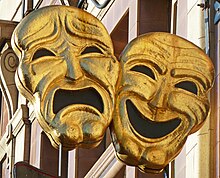Comedy and tragedy masks

The comedy and tragedy masks are a pair of masks, one crying and one laughing, that have widely come to represent the performing arts. Originating in the theatre of ancient Greece, the masks were said to help audience members far from the stage to understand what emotions the characters were feeling.[1]
The crying mask is often ascribed the name Melpomene, after the Muse of tragedy, sometimes abbreviated as Melpo, while the laughing mask is named for Thalia, the Muse of comedy, with the Muses often depicted holding their respective masks.[1][2] Melpomene and Thalia were daughters of Zeus. Melpomene means a celebration of dance and song, while Thalia comes from the Greek thallein meaning to flourish or be verdant.[1] They are often depicted wearing the sock and buskin, which have also come to represent comedy and tragedy, and the masks are thus sometimes referred to as Sock and Buskin.[3][better source needed]
The masks have also sometimes been associated with the Greek god Dionysus (the god of wine, for the exaggerated emotions wine-drinking can bring on) and the Roman god Janus (a god with two faces).[1]
References
- ^ a b c d D'Almeida, Cristina (June 21, 2020). "The Origins of the Comedy and Tragedy Masks of Theatre". OnStage Blog. Retrieved 16 May 2024.
- ^ "Masks of Comedy and Tragedy". American Association of Community Theatre. Retrieved 16 May 2024.
- ^ "Sock and Buskin by Artist Unknown". AcademiaAesthetics.com. Retrieved 14 May 2024.
